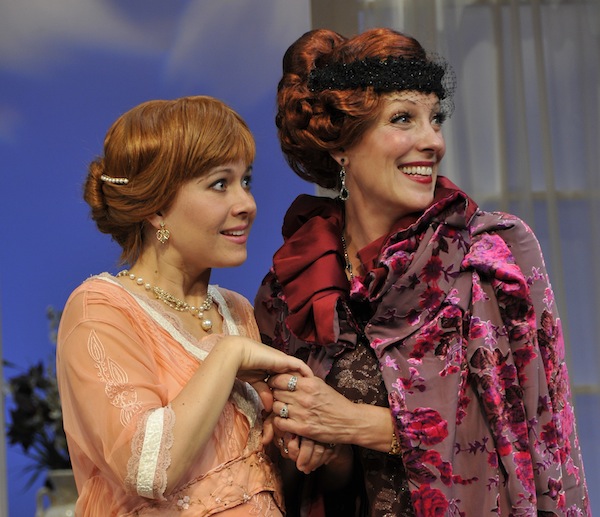Theater Review: Somerset Maugham’s “The Circle” — Drawing-room Comedy Presented with Aplomb
Gus Kaikkonen has shown himself particularly adept at directing period pieces in such a way that they don’t bog down in their period, but convey the life of their own time into our own.
The Circle, by Somerset Maugham. Directed by Gus Kaikkonen. Staged by the Peterborough Players, Peterborough, New Hampshire, through August 17.

The young Elizabeth (Karron Graves) and her wild, estranged mother-in-law, Lady Kitty (Lisa Bostnar) in Peterborough Players’ production of “The Circle.” Photo: Deb Porter Hayes.
By Jim Kates
The premise of Somerset Maugham’s 1921 hit drawing-room comedy — repeat, comedy — The Circle is that all unhappy families are alike, and each happy family is unhappy in its own way. In one generation a dissatisfied wife has run away from her conventional husband and their five-year-old child (you see, the allusion to Anna Karenina is not gratuitous) and in the next generation her daughter-in-law would like to do the same.
Gus Kaikkonen has shown himself particularly adept at directing period pieces in such a way that they don’t bog down in their period, but convey the life of their own time into our own. What he has done with The Circle and the Peterborough Players is exactly that; and, as is especially clever in a repertory company, he lets the play resonate thematically in its marital entanglements and generational confrontation with the previous offering of the company, The Granite State, the most up-to-date and localized play of this season. Kaikkonen here is especially good at manipulating the cuckoo-clock way characters pop in and out of set designer Charlie Morgan’s French doors, conveniently creating space for one-on-one conversations.
The first act, mercifully short, comes close to bogging down in exposition of the most expository kind. On the first night, the cast seemed still to be going over their lines here, not living them yet, which didn’t help. “They’re motoring down in time for luncheon” is the kind of wording that anchors the play firmly in time, place and class, and much of the act proceeds accordingly. Fortunately, Acts Two and Three allow for character, action and interaction, and a much livelier, natural pace, well worth waiting for. The pyrotechnical center of the play comes square in the second act, in a conversation between Lady Catherine Champion-Cheney (Lisa Bostnar) and her (not quite ex-) husband Clive (Anderson Matthews) but the fireworks spread in all directions, illuminating their son Arnold (Tom Frey) his wife Elizabeth (Karron Graves) Lady “Kitty”‘s Lochinvar, Lord Porteous (Michael Page) and the object of Elizabeth’s affections, Teddy Luton (Casey Jordan).
Matthews, basking in the genial worldly-wise sparkle of Champion-Cheney, at one point says, “I see.” An audience member in the row behind me echoed, “he sees!” The actor seems to be channeling a very sympathetic Claude Rains, but to say very much more about his role is to risk spoiling his final moment. The chemistry between Matthews and Bostnar makes for a convincing fireworks display that doesn’t lessen a slightly different but equally believable chemistry between Bostnar and Page. Page, who can always be depended on to channel the essence of curmudgeonry, mellows to the point that he becomes surprisingly lovable in Act Three; but it is Bostnar who negotiates the swing, demonstrating at one and the same time “frivolity and affectation” and a different worldly wisdom from that expressed by either of her men.
If the parents have eaten sour grapes, the children’s teeth are set on edge. They aren’t quite up to their elders’ passions. Maugham intended Arnold to be stuck-in-the-mud, interested explicitly only in politics and period home decoration. Frey plays him so close to authorial intent that there is not more to the character than that. There are implications in the role that Frey does not explore. And Jordan’s Teddy Luton, whom we first meet in the classically clichéd “Tennis, anyone?” kind of entrance (Was it already a cliché in 1921, or did Maugham invent it?) seems far too wimpy to engage Elizabeth’s love, a paler imitation of Shaw’s Ricky Ticky Tavy from Man and Superman. This adds to the comedy, but it puts the burden of all the fun and passion onto Graves, who just barely carries it off.
Maugham’s writing throughout his career was distinguished by the latitude, sympathy, and depth he gave to the needs and desires of his female characters. During the course of The Circle Lady Kitty voices a serious lecture on women’s economic dependence, a condition that underlies the decisions that Elizabeth has to make. It’s perhaps the most difficult moment in the play to pull off, but necessary to a startling dénouement, which, in retrospect, has been ordained from the beginning.
Jim Kates is a poet, feature journalist and reviewer, literary translator and the president and co-director of Zephyr Press, a non-profit press that focuses on contemporary works in translation from Russia, Eastern Europe and Asia.
